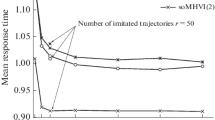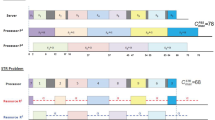Abstract
The paper deals with a single processor scheduling problem in which the sum of values of all jobs is maximized. The value of a job is characterized by a stepwise nonincreasing function with one or more moments at which the changes of job value occur. Establishing an order of processing of datagrams which are sent by router is a practical example of application of such problems. We prove that the special case of our problem, with a single moment of change of job values, is equivalent to the well-known, NP-hard in the ordinary sense, problem of minimizing weighted number of late jobs. Next, we show that, based on this equivalence, the existing algorithms for solving the latter problem can be adopted to solve special cases of our problem. Additionally, we construct a pseudopolynomial time algorithm based on the dynamic programming method, for the case with arbitrary number of common moments of job value changes. At the end of the paper, we generalize this algorithm to the corresponding case with parallel processors. Thus, we show that these two problems are also NP-hard in the ordinary sense. Moreover, we construct exact polynomial time algorithms for two further special cases of our problem. Finally, in order to solve the general version of the problem, we construct and experimentally test a number of heuristic algorithms.
Similar content being viewed by others
References
Bachman, A., A. Janiak, A. Kozik, and M. Winczaszek, “Heuristic algorithms for a single machine scheduling problem with changeable job values,” Scientific Bulletins of Silesian Polytechnics, s.Automatics, 134, 23–32 (2002) (in Polish).
Bachman, A., A. Janiak, A. Kozik, and M. Winczaszek, “Single machine scheduling problem with exponentially dependent job values,” Scientific Bulletins of Silesian Polytechnics, s.Automatics, 134, 13–22 (2002) (in Polish).
Bellman, R., Dynamic Programming. Princeton University Press, Princeton, MJ, 1957.
Cheng, T. C. E. and M. Y. Kovalyov, “Single machine batch scheduling with sequential job processing,” IIE Transplantation, 33, 413–420 (2001).
Cheng, T. C. E., M. Y. Kovalyov, and B. M.-T. Lin, “Single machine scheduling to minimize batch delivery and job earliness penalties,” SIAM Journal of Optimization, 7(2), 547–559 (1997).
Coffman, Jr., E. G. (ed.), Computer & Job-Shop Scheduling Theory, Wiley, New York, 1976.
Gens, G. V. and E. V. Levner, “Approximation algorithm for some scheduling problems,” Engineering Cybernetics, 6, 33–46 (1978).
Gens, G. V. and E. V. Levner, “Fast approximation algorithm for job sequencing with deadlines,” Discrete Applied Mathematics, 3, 313–318 (1981).
Graham, R. L., E. L. Lawler, J. K. Lenstra, and A. H. G. Rinnooy Kan, “Optimization and approximation in deterministic sequencing and scheduling: A survey,” Annals of Discrete Methods, 5, 287–326 (1979).
Janiak, A. and T. Krysiak, “A single machine scheduling problem with a single change of job value,” in: Proceedings of the 9th IEEE International Conference on Methods and Models in Automation and Robotics (MMAR 2003), 25–28 August 2003, Miedzyzdroje, Poland (2003), pp. 1139–1143.
Karp, R. M., “Reducibility among combinatorial problems,” in: Miller R. E. and Thatcher J. W. (eds.), Complexity of Computer Computations, Plenum Press, New York (1972), pp. 85–103.
Lawler, E. L., Combinatorial Optimization: Networks and Matroids, Holt, Rinehart & Winston, New York, 1976a.
Lawler, E. L., “Sequencing to minimize the weighted number of tardy jobs,” RAIRO Research Operations, 10(Suppl.), 27–33 (1976b).
Lawler, E. L., J. K. Lenstra, A. H. G. Rinooy Kan, and D. B. Shmoys, “Sequencing and scheduling: Algorithms and complexity,” in: Graves S. C., Rinnooy Kan A. H. G. and Zipkin P. (eds.), Handbooks in Operations Research and Management Science, North-Holland (1993), pp. 445–522.
Lawler, E. L. and J. M. Moore, “A functional equation and its application to resource allocation and sequencing problems,” Management Science, 16, 77–84 (1969).
Monma, C. L., “Linear-time algorithms for scheduling on parallel processors,” Oper Res, 30, 116–124 (1982).
Moore, J. M., “An n jobs, one machine sequencing algorithm for minimizing the number of late jobs,” Management Science, 15, 102–109 (1968).
Pinedo, M., Scheduling: Theory, Algorithms and Systems, Prentice Hall, NJ, 1995.
Potts, C. N. and M. Y. Kovalyov, “Scheduling with batching: A review,” European Journal of Operational Research, 120, 228–249 (2000).
Sahni, S., “Algorithms for scheduling independent tasks,” Journal of the Association for Computing Machinery, 23, 116–127 (1976).
Villarreal, F. J. and R. L. Bulfin, “Scheduling a single machine to minimize the weighted number of tardy jobs,” IIE Transition, 15, 337–343 (1983).
Voutsinas, T. G. and C. P. Pappis, “Scheduling jobs with values exponentially deteriorating overtime,” International Journal of Production Economics, 79, 163–169 (2002).
Author information
Authors and Affiliations
Corresponding author
Rights and permissions
About this article
Cite this article
Janiak, A., Krysiak, T. Single processor scheduling with job values depending on their completion times. J Sched 10, 129–138 (2007). https://doi.org/10.1007/s10951-006-0004-6
Published:
Issue Date:
DOI: https://doi.org/10.1007/s10951-006-0004-6




